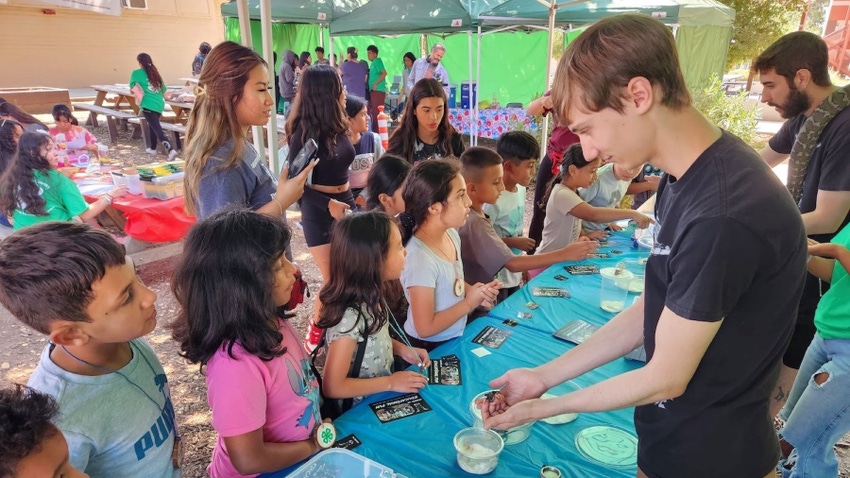August 15, 2023

By Linda Forbes
University of California Cooperative Extension, 4-H Youth Development Program in Santa Clara County partnered with multiple community organizations to hold a 4-H Nature Explorers Day Camp at Escuela Popular Bilingual Academy in East San Jose from July 17 to July 21.
Organizers wanted to reach more participants this year than they had in the inaugural 2022 camp, so they structured the program for different K-8 grade levels to attend on different days. 79 campers participated, which was a 130% increase over the number of campers last year.
“Everything we did during the week was focused on environmental science,” said Susan Weaver, 4-H Regional Program Coordinator. “We partnered with Project Learning Tree, UC Environmental Stewards, UC Master Gardeners and CalFresh Healthy Living, UC– as well as community agencies related to the natural environment.”
Numerous activities engaged the youths such as field trips; demonstrations; and sessions themed around trees as habitats, birds and bugs, and being “leaf detectives.” 4-H Adult Volunteer, Laura Tiscareno, took charge of the hands-on Project Learning Tree sessions. Craft time included making nature-themed wind chimes and spinning paper snakes.
Bilingual teen camp counselors guided small groups of students for the duration of the day camp. In situations where the adult facilitator did not speak Spanish, teens translated information into Spanish for students with less English confidence.
“These kids call me ‘teacher' and it's awesome,” said Rodrigo, one of the counselors. “The camp benefits me a lot because I connect with children and in the future, I can even be a teacher if I wanted to.”
Another counselor, Andrea, learned about communication. “It's a bit different with kids at different age levels,” she said. “Since we had kindergarten through eighth grade, we had to switch our tactics from grade to grade so that they would understand us and we'd be able to understand them. Also learning how to bond with them so that they would pay more attention.
One highlight of the week was a field trip for third through eighth graders to the Master Gardeners location at Martial Cottle Park, where students learned about vermicomposting and made their own individual countertop worm habitat and composter.
Interactive demonstrations
Campers especially enjoyed the interactive demonstrations. “My favorite part is going on all the field trips because we went to a garden, and we've been catching worms and doing stuff about worms,” said one student. “It's really fun going on trips.”
Another camper said, “Something I would like to change about camp is having more time here.”
The program culminated in a Nature Camp Festival at Escuela Popular in partnership with community agencies. Youth enjoyed games, meeting reptiles, outdoor science activities, arborist crafts, a “Rethink Your Drink” table to make a fresh fruit drink, tamales, a nacho bar and more.
Representatives from the Silicon Valley Wildlife Center discussed animals that live in local neighborhoods and how the Center supports people to keep the animals safe. Victor Mortari of Vexotic Me talked about and showed snakes, spiders, scorpions, and other creatures, making the kids squeal while learning about them. As a fun added bonus, 4-H Community Educator Zubia Mahmood arranged to have a local team come to teach soccer skills as a healthy living activity.
The event increased the youth's interest in environmental education and involved Latino youth and adults who are new to 4-H – representing a community that has not historically benefited from the 4-H program. The teen teachers also increased their leadership and career readiness skills; post-camp surveys showed that all the teen counselors see 4-H as a place where they can be a leader and help make group decisions. Some campers noted in the survey that they wanted the camp to be every day, all summer.
National 4-H funded the camp in 2022 and 2023, allowing organizers to provide meals, T-shirts, water bottles and other items to foster belonging and promote healthy living. Community partners, crucial to the program's success, included the Boys and Girls Club of Silicon Valley, Escuela Popular Bilingual Academy, Silicon Valley Water and Silicon Valley Wildlife Center.
[Linda Forbes is director of strategic communications at UCANR.]
Source: University of California Division of Agriculture and Natural Resources
You May Also Like




